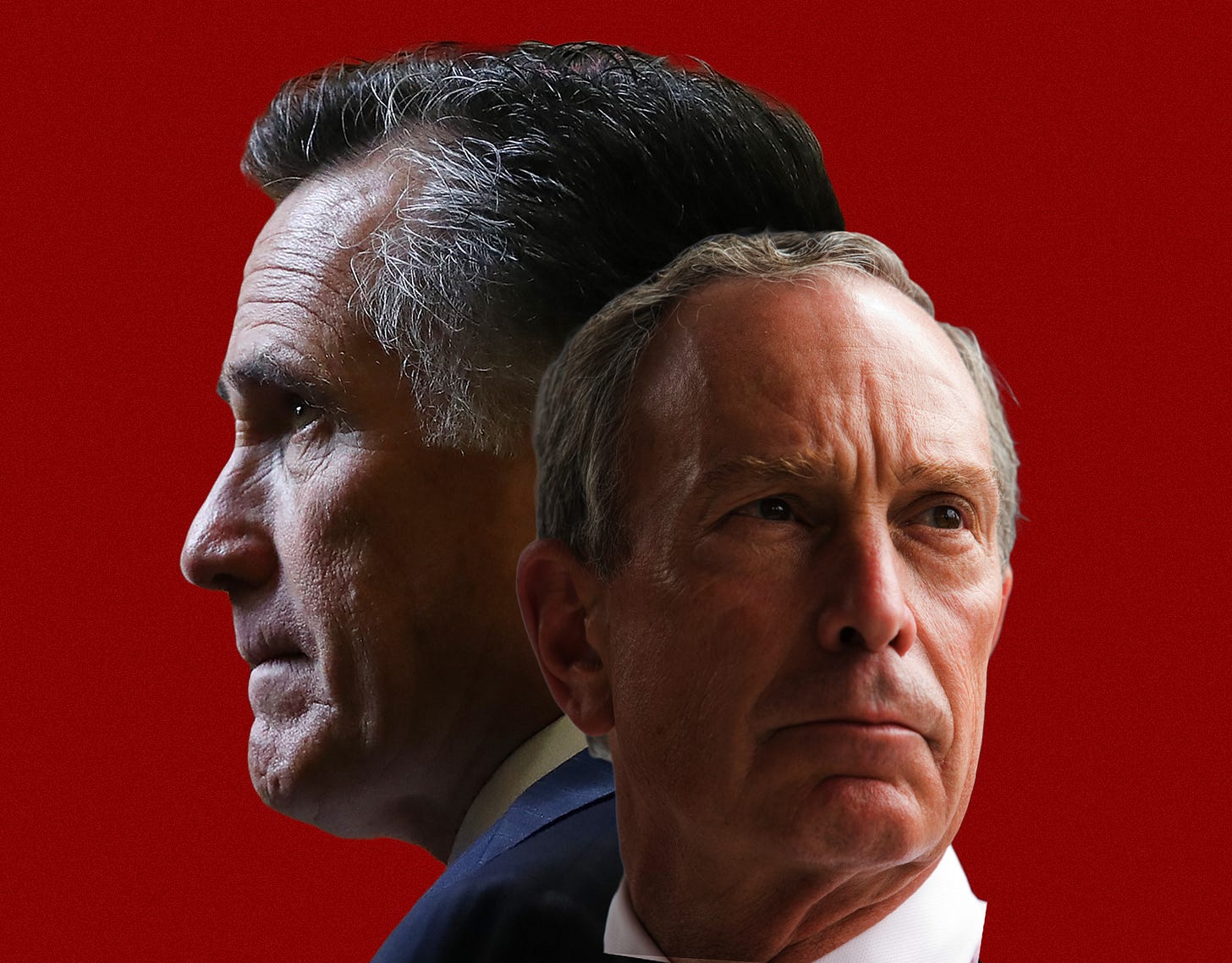Romney-Bloomberg: The Unity Ticket America Deserves
Independent voters are being abandoned by two parties moving further and further out to their poles. There's a way a third-party run could break the logjam in 2020.
In casting his singular vote to impeach and remove Donald Trump from office, Mitt Romney made history. Now it’s time for him to take a step further. For the good of the country, Senator Romney should run for president as an independent.
With the democratic-socialist Bernie Sanders now the Democratic frontrunner and the political arsonist Donald Trump as the Republican incumbent, there is a yawning chasm that has never before existed in American politics. By retreating to their poles, our two major parties have left tens of millions of independents and moderate Democrats and Republicans unrepresented.
Senator Romney's entrance into the presidential race wouldn’t just give the vital center of the electorate a home—it would stand a chance to break a system that is stacked against independents and third party candidates. The last major third-party run was in 1992, when Ross Perot won 19 percent of the vote—and he accomplished this while running against two party centrists, in Bill Clinton and George H.W. Bush. Against two polarizing fringe candidates with no claim to the middle of American politics, we have no idea what Romney’s ceiling might be. And as Emmanuel Macron showed in France, standing up a new party and winning a presidential election in one motion is not impossible.
In America the odds are extraordinarily long for any independent candidate. That is largely a problem of access and funding, which both the Democrat and Republican parties have been unified in blocking. But even if Romney didn’t win, his candidacy could bring enough public pressure to force the parties to give up their duopoly as citizens realize that until the possibility for a viable third party exists, we’re going to keep being forced to choose between unpopular candidates beholden to their party's extremes.
Under the current system, presidential candidates in the general election need at least 15 percent support in select polls to make the debate stage. Since this arbitrary benchmark was enacted, no third party or independent candidate has been able to qualify. Much of this is due to a lack of access to capital. Estimates show that it would cost $266 million to achieve this benchmark in the general election phase of a presidential run—a feat only an independent candidate who is self-funded is likely to achieve.
Another barrier to entry that independent candidates face is they do not have the name recognition that affiliating with a major party grants.
Mitt Romney would solve both of these problems.
As the Republican party’s nominee for president in 2012, Romney’s name recognition is already high. He has the credibility and trust of moderate Republicans who see him as a sane alternative to the insanity of the president’s Twitter storm and Bernie’s socialist utopia. He could easily cross the 15 percent polling threshold.
And given Romney’s strong private sector background, he has access to ample funds to seed a nascent campaign operation off the ground before building momentum that would bring in outside donors: traditionally conservative organizations that find Trump erratic and pro-business Democrats who are fearful of Sanders’ espoused socialism.
But the biggest opportunity comes with the other half of the ticket: Because Romney would have the chance to select Michael Bloomberg as his vice president.
Think about that for a moment: Bloomberg is the last Republican to be elected mayor of one of the country’s most liberal cities. And while he has since switched his party affiliation, he has demonstrated that he has the ability to build big tent coalitions across partisan divides.
A Romney-Bloomberg ticket would be a first in modern American politics: A bipartisan unity ticket running under the banner of an independent third party.
It would give both disgruntled Republicans who feel their party has become lost in Trump’s personality cult and Democrats who feel their party is lurching too far left towards a socialist revolution a voice on the ballot that reflects a popular idea of how the country should be run.


